With the re-release of their most acclaimed performance chair, Herman Miller boosts Aeron’s sustainability credentials – and proves that perfection can, in fact, be improved upon.

September 29th, 2021
The instantly recognisable silhouette of Herman Miller’s globally renowned work chair has been synonymous with innovation since its inception in 1994. A chair so iconic that it’s a part of the permanent collection of MOMA, Aeron was conceived out of the need to best support people, and over the last 27 years, it’s been constantly enhanced, improved and advanced alongside relevant research, material innovation and the ever-changing needs of its users.
In line with that philosophy, Aeron’s latest iteration once again aligns with the moods, priorities and requirements of the modern consumer. Sustainability has become one of the most vital considerations for us today. The increasing threat of global warming has seen people change their lifestyles to create a more positive impact on the environment – and they expect brands to do the same. As an organisation that’s always held a human need at the heart of everything they do and uses innovation to advance their products to better respond to the dynamically changing demands of the modern world, Herman Miller will now incorporate ocean-bound plastic into the bodies of Aeron chairs.

Environmental considerations have always been at the heart of this innovative design. Revolutionary not only in ergonomics but also where material innovation was concerned, Aeron – which today is made up of over 50% recycled content and is up to 90% recyclable – was made without incorporating any of the materials found in other office furniture of the era. The iconic chair was also Herman Miller’s first product to receive the industry-leading Cradle to Cradle V3 Silver Level certification, assessed based on environmental and social performance. And now, this overhaul will see each chair within the Aeron portfolio contain a portion of mismanaged plastic waste found near waterways. Depending on the configuration, the ocean-bound plastic will be incorporated into the frames and tilt covers of the chairs and will see each product contain between 226.8 grams and 1.13 kilograms of plastic waste. That equates to approximately 23 to 114 plastic water bottles per chair.

The introduction of ocean-bound plastic in Herman Miller’s best-selling range of task chairs furthers its sustainability profile and advances the brand’s ambitious environmental commitments as part of its involvement with NextWave Plastics – the first global network of ocean-bound plastic supply chains that aims at reducing the volume of plastic waste.
“Every year, an estimated eight million tons of plastic enter the ocean. This is roughly equivalent to dumping a garbage truck full of plastic into the ocean every minute,” says Gabe Wing, Herman Miller’s Director of Sustainability. The brand estimates that the integration of ocean-bound plastic in the Aeron range of chairs will contribute to diverting up to 234 metric tons of plastic from the ocean per year. “We joined NextWave to play an active role in taking on the ocean plastic problem and cast a wide net for opportunities to incorporate ocean-bound plastic across our global operations. We’re proud of the progress we’ve already made with packaging and textiles and are eager to continue doing our part in preventing harmful plastic from reaching our oceans by adding it to the iconic Aeron Chair,” Gabe adds.

Apart from becoming even more sustainable, the impressive range will remain completely unchanged, preserving all the qualities that have earned Aeron worldwide recognition – including the range’s inclusive sizing that caters for a broad spectrum of body shapes and sizes.
However, along with the new sustainability initiative, Herman Miller is also launching a new, exquisite colourway that further modernises the best-selling classic. The new colour, Onyx Ultra Matte, contains the highest amount of ocean-bound plastic at almost 1.13kg per chair and joins a carefully curated colour palette inspired by the elements sourced from the Earth.

Mineral, the lightest of the four shades, is the most delicate in its expression and offers a more subtle visual outcome, making it the perfect choice for open spaces. The Carbon colourway steps it up in terms of colour depth. As a balanced neutral, it works well in a range of environments and with a variety of colour palettes. The classic Graphite colour provides a distinct dark grey with a classic textured finish, while Onyx Ultra Matte adds a dramatic, profoundly black shade that elevates the world’s most iconic work chair. In addition, the new colourway boasts a striking matte finish and is the darkest colour Aeron has been ever produced in, encapsulating some of the elements regularly requested by Herman Miller’s clients. The result is a distinct, considered and incredibly harmonious colour palette that astutely highlights Aeron’s iconic qualities while keeping up with the needs and preferences of the modern consumer.

The latest re-release of the Aeron chair further advances Herman Miller’s commitments to use 50% recycled content in all materials by 2030. This means the end-users will enjoy the renowned seating icon in a more environmentally forward and modernised form – which will soon be available to Australian clients. The iconic Aeron in the magnificent Onyx Ultra Matte colourway will launch in November, inaugurating the iconic range with an even more sustainable profile in Australia.
INDESIGN is on instagram
Follow @indesignlive
A searchable and comprehensive guide for specifying leading products and their suppliers
Keep up to date with the latest and greatest from our industry BFF's!
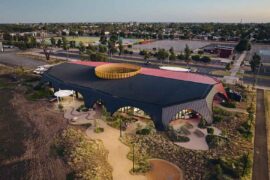
At the Munarra Centre for Regional Excellence on Yorta Yorta Country in Victoria, ARM Architecture and Milliken use PrintWorks™ technology to translate First Nations narratives into a layered, community-led floorscape.
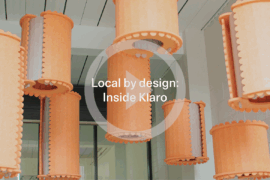
In an industry where design intent is often diluted by value management and procurement pressures, Klaro Industrial Design positions manufacturing as a creative ally – allowing commercial interior designers to deliver unique pieces aligned to the project’s original vision.

For those who appreciate form as much as function, Gaggenau’s latest induction innovation delivers sculpted precision and effortless flexibility, disappearing seamlessly into the surface when not in use.
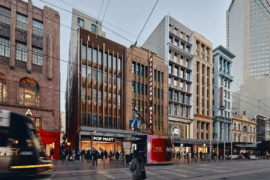
Merging two hotel identities in one landmark development, Hotel Indigo and Holiday Inn Little Collins capture the spirit of Melbourne through Buchan’s narrative-driven design – elevated by GROHE’s signature craftsmanship.

AHEC has produced a documentary exploring forestry and stewardship through long-term forest management and human responsibility.
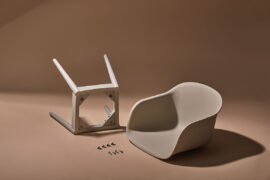
MillerKnoll releases the 2025 Better World Report showcasing how design can drive meaningful change through measurable progress across social, environmental and governance initiatives

BLP’s new Sydney Children’s Hospital, Randwick building brings together paediatric care, family-centred design and Australia’s first Children’s Comprehensive Cancer Centre in a major addition to the Randwick Health & Innovation Precinct.
The internet never sleeps! Here's the stuff you might have missed
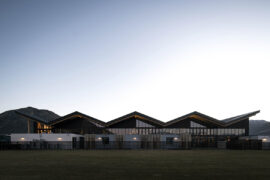
Warren and Mahoney’s The Mill in Queenstown blends architecture, wellbeing and landscape, creating a transparent training facility.
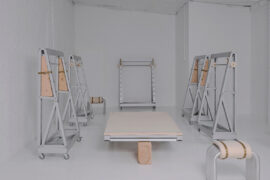
Melbourne-based Studio Edwards has designed Shift+Space, a modular system under the banner of ‘adaptive retail architecture’. Ben Edwards tells us more.